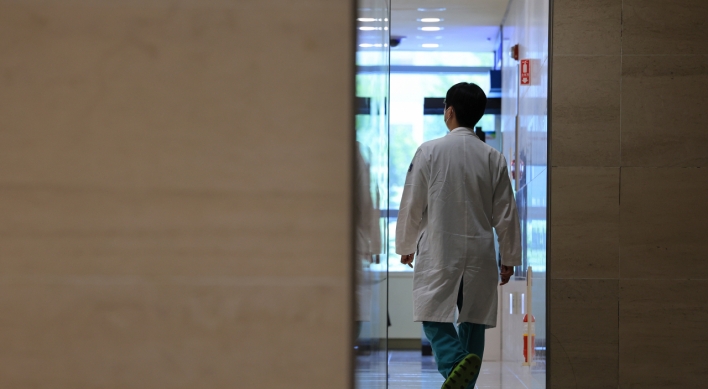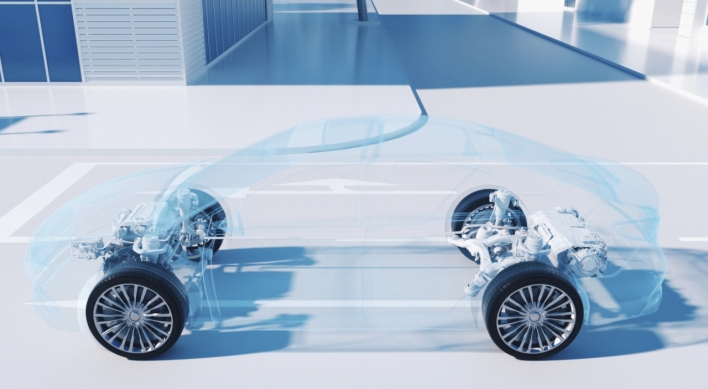[Editorial] Beyond mudslinging
More policy details needed in debate; Ahn proposes candidate merger
By Korea HeraldPublished : Feb. 14, 2022 - 05:30
In the second TV debate held Friday, two leading presidential candidates relied on mudslinging, rather than engaging in serious discussion of policy.
The verbal attacks between Lee Jae-myung of the ruling Democratic Party of Korea and Yoon Suk-yeol of the main opposition People Power Party heated up during the debate arranged by the Journalists Association of Korea.
For many of Korean voters who watched the debate, fierce attacks on corruption allegations made it hard to understand which policies the country’s top leader would take after the presidential election slated for March 9.
That is regrettable, especially given that the presidential race is set to become more complicated as Ahn Cheol-soo of the centrist People’s Party, who also attended the second debate, officially proposed merging candidacies with Yoon Suk-yeol on Sunday.
During the 130-minute debate, what became clearer was the gloomy outlook that, whichever of the top two candidates is elected, Koreans would be forced to live with a new leader facing a slew of corruption allegations and family-related scandals in the next five years.
Yoon Suk-yeol spent much of his allotted time during a debate program on raising questions his main rival Lee Jae-myung on allegations of corruption involving land development projects and Seongnam FC soccer club based in Seongnam, Gyeonggi Province, where Lee served as mayor.
Lee made attacks against Yoon’s wife Kim Keon-hee, raising questions about her alleged entanglement in the stock manipulation case surrounding Deutsch Motors, a BMW car dealer here.
Since the two candidates continued to slam each other without considering the original purpose of the debate, the chair of the debate stepped in, asking them to return to the purported topic of youth policy, illustrating the underlying problem with the way the debate played out.
Of course, presidential debates are open to discussions on candidates’ qualifications related to corruption allegations and moral issues. But Friday’s debate did not reveal anything new.
In response to Yoon’s attack on the alleged land deals in Seongnam, Lee denied any wrongdoing, saying that he “designed a structure to retrieve public profit while the People Power Party designed a corruption structure.” Lee’s comment refers to the framing battle on the corruption allegations between the ruling and the main opposition parties.
On his wife’s alleged involvement in stock manipulation, Yoon said that the prosecution conducted a massive investigation into the scandal for two years, but did not find any wrongdoing.
Particularly worrisome is that candidates did not fully understand the policy plans and election pledges of their rivals. Whenever an explosive and exaggerated offensive was made on an issue, candidates promptly pointed out that their rivals did not have a clear understanding of the issue in question, or lying.
There were some new policy-related details revealed by the four candidates. They clarified their stances on policies on “worker director” of labor unions, law schools and compensations for small business owners who suffered losses during the pandemic.
For instance, Rep. Sim Sang-jung, presidential nominee of the left-wing Justice Party, called for legislation aimed at securing funds to compensate small businesses battered by the spread of COVID-19.
During the televised debate, Ahn Cheol-soo criticized the two main candidates for kicking off a dispute over political revenge, instead of mapping out specific policy plans for the nation.
It remains to be seen whether Ahn will be able to unify candidacies with Yoon. What’s certain is that Korean voters deserve opportunities to check out candidates’ vision, leadership and election pledges in the forthcoming TV debates.
The verbal attacks between Lee Jae-myung of the ruling Democratic Party of Korea and Yoon Suk-yeol of the main opposition People Power Party heated up during the debate arranged by the Journalists Association of Korea.
For many of Korean voters who watched the debate, fierce attacks on corruption allegations made it hard to understand which policies the country’s top leader would take after the presidential election slated for March 9.
That is regrettable, especially given that the presidential race is set to become more complicated as Ahn Cheol-soo of the centrist People’s Party, who also attended the second debate, officially proposed merging candidacies with Yoon Suk-yeol on Sunday.
During the 130-minute debate, what became clearer was the gloomy outlook that, whichever of the top two candidates is elected, Koreans would be forced to live with a new leader facing a slew of corruption allegations and family-related scandals in the next five years.
Yoon Suk-yeol spent much of his allotted time during a debate program on raising questions his main rival Lee Jae-myung on allegations of corruption involving land development projects and Seongnam FC soccer club based in Seongnam, Gyeonggi Province, where Lee served as mayor.
Lee made attacks against Yoon’s wife Kim Keon-hee, raising questions about her alleged entanglement in the stock manipulation case surrounding Deutsch Motors, a BMW car dealer here.
Since the two candidates continued to slam each other without considering the original purpose of the debate, the chair of the debate stepped in, asking them to return to the purported topic of youth policy, illustrating the underlying problem with the way the debate played out.
Of course, presidential debates are open to discussions on candidates’ qualifications related to corruption allegations and moral issues. But Friday’s debate did not reveal anything new.
In response to Yoon’s attack on the alleged land deals in Seongnam, Lee denied any wrongdoing, saying that he “designed a structure to retrieve public profit while the People Power Party designed a corruption structure.” Lee’s comment refers to the framing battle on the corruption allegations between the ruling and the main opposition parties.
On his wife’s alleged involvement in stock manipulation, Yoon said that the prosecution conducted a massive investigation into the scandal for two years, but did not find any wrongdoing.
Particularly worrisome is that candidates did not fully understand the policy plans and election pledges of their rivals. Whenever an explosive and exaggerated offensive was made on an issue, candidates promptly pointed out that their rivals did not have a clear understanding of the issue in question, or lying.
There were some new policy-related details revealed by the four candidates. They clarified their stances on policies on “worker director” of labor unions, law schools and compensations for small business owners who suffered losses during the pandemic.
For instance, Rep. Sim Sang-jung, presidential nominee of the left-wing Justice Party, called for legislation aimed at securing funds to compensate small businesses battered by the spread of COVID-19.
During the televised debate, Ahn Cheol-soo criticized the two main candidates for kicking off a dispute over political revenge, instead of mapping out specific policy plans for the nation.
It remains to be seen whether Ahn will be able to unify candidacies with Yoon. What’s certain is that Korean voters deserve opportunities to check out candidates’ vision, leadership and election pledges in the forthcoming TV debates.
-
Articles by Korea Herald









![[Kim Seong-kon] Democracy and the future of South Korea](http://res.heraldm.com/phpwas/restmb_idxmake.php?idx=644&simg=/content/image/2024/04/16/20240416050802_0.jpg&u=)










![[Today’s K-pop] Zico drops snippet of collaboration with Jennie](http://res.heraldm.com/phpwas/restmb_idxmake.php?idx=642&simg=/content/image/2024/04/18/20240418050702_0.jpg&u=)